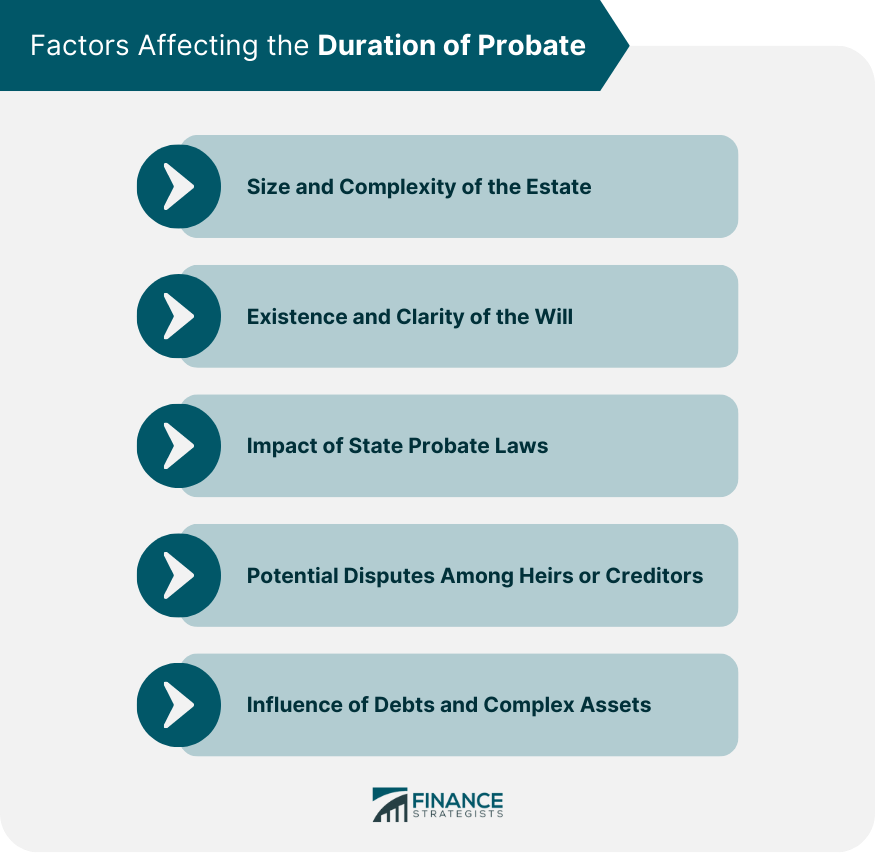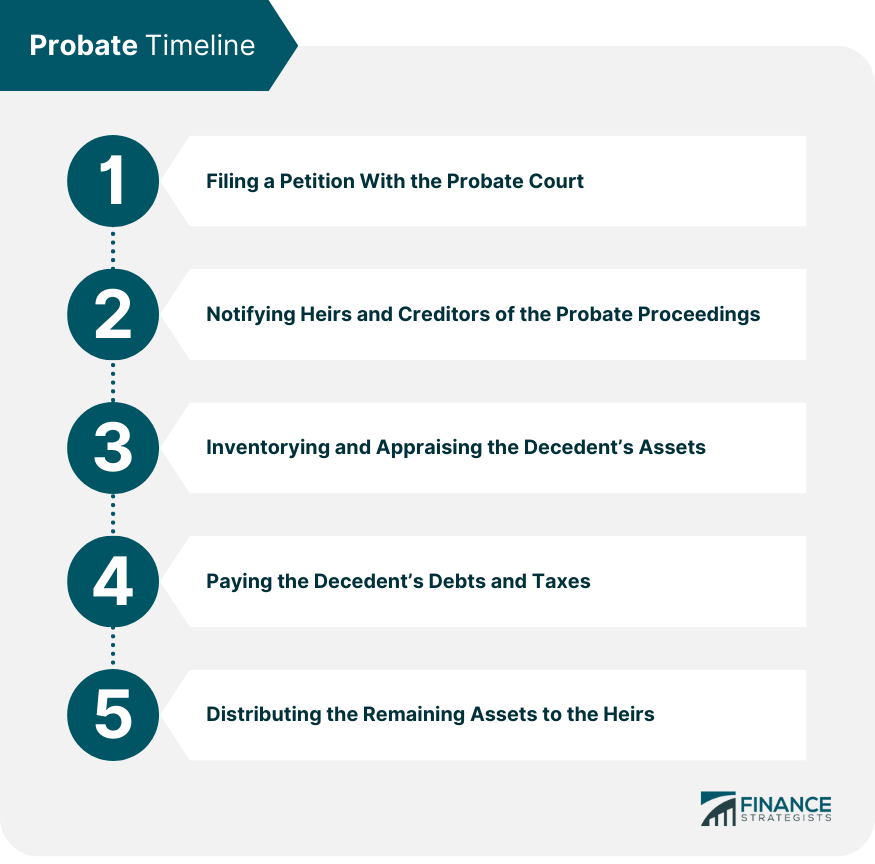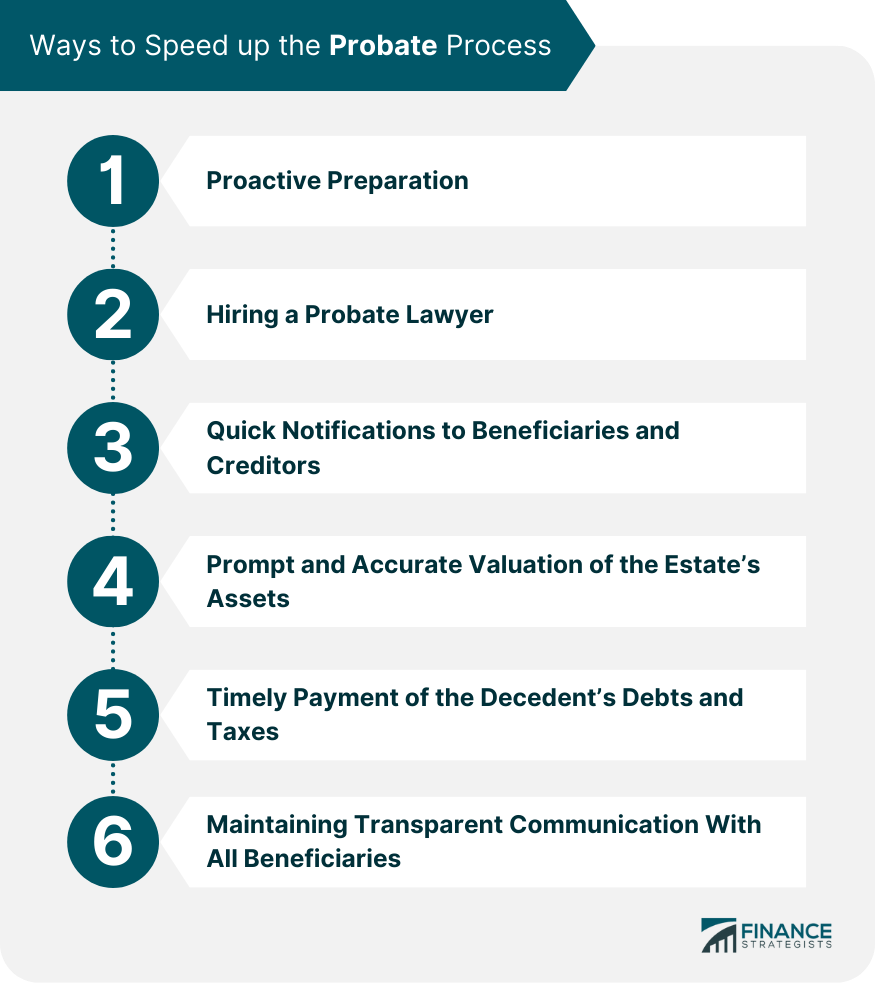Yes, probate has a time limit but it varies by jurisdiction. Typically, the executor has a responsibility to begin the process shortly after the decedent's death. It's usually recommended to initiate probate within a year. However, the entire process can extend from several months to a few years, depending on estate complexity. If not promptly initiated or reasonably progressed, beneficiaries may petition the court to replace the executor for delay. Therefore, while no universal hard limit exists, timely execution is crucial in probate proceedings. Probate is a legal process through which a person's estate is managed and distributed after their death. When an individual, known as the decedent, passes away, their assets (such as property, money, and personal possessions) are identified, valued, and distributed to beneficiaries according to their last will and testament. If there's no valid will, the estate is divided as per state intestacy laws. Probate also involves settling the decedent's debts and paying necessary taxes. Understanding the time limits in probate is crucial for executors and beneficiaries. Deadlines need to be met, and delays can lead to legal complications, additional costs, and potential disputes among interested parties. Knowing the timeframe can help in planning, preparing for potential challenges, and ensuring the smooth execution of the decedent's will. Probate time frames can significantly vary, depending largely on the complexity of the estate and the efficiency of the probate court. Typically, the process can take anywhere from a few months to several years. However, most uncontested probates tend to be completed within six to twelve months. Large estates with numerous assets typically take longer to probate than smaller ones, as they require a more exhaustive inventory and valuation process. Complex assets such as business interests, foreign properties, or extensive investment portfolios can further complicate the process, extending the duration of probate. If a clear, legally valid will is in place, the probate process tends to move more swiftly as it provides a roadmap for the distribution of the estate's assets. In contrast, if no will exists or if the will is unclear or contested, probate can be considerably prolonged due to additional legal proceedings. Different states have different probate procedures, forms, and timelines, all of which can affect how long probate takes. Some states offer simplified probate processes for smaller estates, which can expedite the process, while others may have more complex probate requirements that can extend the timeframe. If heirs contest the will or creditors dispute the amount they're owed, these conflicts can lead to court hearings and potential litigation. Resolving these disputes can take time, further extending the probate process. The executor is responsible for settling the decedent's debts before distributing the remaining assets to beneficiaries. This process can take considerable time, especially if the estate lacks the liquid assets necessary to pay off these debts. Furthermore, complex assets like business interests or foreign properties often require additional time and expertise to properly manage and distribute. When a person dies, the named executor in the will or a close relative usually initiates the probate process. This typically begins by filing a petition with the probate court in the county where the decedent lived, often within 30 days of the death. The court then formally appoints the executor to handle the estate. Most states don't impose a specific deadline for initiating probate, but it should generally be done as soon as possible. In some cases, however, there may be a statute of limitations for filing the will. For instance, in Texas, a will must be submitted to probate within four years of the individual's death. Failing to initiate probate in a timely manner can lead to several issues, including the possibility of the will being considered invalid, potential disputes among heirs, and additional financial burdens from unnecessary taxes and fees. Furthermore, some assets may decrease in value over time, which can further complicate matters and decrease the overall value of the estate. The probate process typically begins with the executor, as named in the decedent's will, filing a petition with the probate court. If no will exists, a close relative or interested party may petition the court to be appointed as the estate's administrator. This step officially commences the probate process and establishes the legal authority to administer the estate. Once the probate process has begun, the executor or administrator is required to notify relevant parties. This typically includes the decedent's heirs, beneficiaries named in the will, and any known creditors. Notification informs these parties of the probate proceedings and provides them with an opportunity to file any claims against the estate or object to the will. This involves creating a detailed list of the decedent's property, including real estate, personal belongings, bank accounts, and other assets. Once identified, these assets must be professionally appraised to determine their fair market value at the time of the decedent's death. Before any distribution to the beneficiaries, the decedent's outstanding debts and taxes must be settled. The executor is responsible for using the estate's assets to pay off these liabilities. This can include debts owed to creditors, final expenses such as funeral costs, and any estate or inheritance taxes due. After paying the debts and taxes, the executor can distribute the remaining assets to the beneficiaries as per the will's directives. If no will exists, assets are distributed according to state intestacy laws. This final step concludes the probate process, ultimately fulfilling the decedent's final wishes and settling their affairs. Several variables can extend the probate process, including: Estate Complexity: Estates with many assets, especially complex ones like businesses or investments, take longer to probate. Outstanding Debts and Taxes: If the decedent left behind significant debts or taxes, these must be settled before assets can be distributed to the beneficiaries. Will Disputes: If someone challenges the will, the probate process can be significantly prolonged. Inefficient Court Systems: In some areas, court systems may be backlogged, causing further delays. Multiple Jurisdictions: If the decedent owned property in multiple states or countries, additional probate proceedings may be needed, extending the timeframe. Once the probate process has started, creditors typically have a limited period to file claims against the estate. This period varies by state, but it generally ranges from a few months to a year. After this period, most debts are discharged, and the creditor is unable to make a claim against the estate. Similarly, beneficiaries and potential heirs usually have a time limit to contest a will. This deadline can vary significantly between jurisdictions but is often within a few months of the will being admitted to probate. Contesting a will is a serious matter that can greatly extend the probate process and potentially result in legal fees and strained relationships among family members. Legal disputes, such as will contests or disputes between beneficiaries, can extend the probate process significantly. These conflicts often require court intervention, which can lead to extended timelines, higher costs, and a potential drain on the estate's assets. Complex estates—those with multiple properties, diverse assets, or significant debts—often require additional time for administration. Probating such estates may involve resolving complicated tax issues, valuing unique assets, and managing or selling businesses, all of which can prolong the process. The probate process can be time-consuming, but there are several strategies to speed it up: Proactive Preparation: Gather all necessary documents including the will, death certificate, and information about the deceased's assets and debts. This groundwork can save considerable time. Legal Assistance: Hiring a probate lawyer can streamline the process. Their experience and knowledge can help navigate through complex legalities efficiently and avoid potential pitfalls. Quick Notifications: Notify all beneficiaries, creditors, and relevant government agencies promptly. This action triggers various time limits for filing claims and helps avoid future complications. Asset Assessment: Carry out a prompt and accurate valuation of the estate’s assets. An early appraisal aids in the swift distribution of assets and calculation of any estate taxes due. Debt Settlement and Tax Filing: Timely payment of the decedent’s debts and taxes can help prevent delays in the process. Transparent Communication: Keeping clear, open communication with all beneficiaries can help to prevent any disputes that may arise, thus avoiding unnecessary slowdowns. By adopting these measures, the executor can expedite the probate process significantly. Understanding probate's time limits and factors affecting its duration is crucial for an effective estate settlement. The process, varying by estate complexity and jurisdiction, often lasts several months to a few years, with the onus on the executor to initiate it promptly post-death. Factors such as estate size, clarity of will, state laws, potential disputes, and nature of assets can affect probate's length. Deadlines apply to beneficiaries and creditors, while delays may occur due to legal disputes or intricate estates. A speedy probate process can be facilitated through preparedness, legal assistance, timely notifications, asset assessment, prompt debt settlement, and open communication. Thus, navigating probate's intricacies successfully requires a thorough understanding of its timelines, proactive management, and effective legal counsel.Does Probate Have a Time Limit?
Understanding the Time Limits in Probate
General Time Frames Involved in Probate
Factors Affecting the Duration of Probate
Size and Complexity of the Estate
Existence and Clarity of the Will
Impact of State Probate Laws
Potential Disputes Among Heirs or Creditors
Influence of Debts and Complex Assets

Time Limits on Initiating Probate
Immediately After Death: Steps to Initiate Probate
Statutory Time Limits for Initiating Probate
Consequences of Not Initiating Probate on Time
Probate Process Duration
Probate Timeline: A General Overview
Filing a Petition With the Probate Court
Notifying Heirs and Creditors of the Probate Proceedings
Inventorying and Appraising the Decedent's Assets
Paying the Decedent's Debts and Taxes
Distributing the Remaining Assets to the Heirs

Variables That Can Extend the Probate Process
Statutory Time Limits for Beneficiaries and Creditors
Deadline for Creditors to File Claims
Deadline for Beneficiaries to Contest a Will
Extenuating Circumstances Impacting Probate Time Limit
Delays Due to Legal Disputes
Delays Due to Complex Estates
How to Speed up the Probate Process

The Bottom Line
Does Probate Have a Time Limit? FAQs
Yes, probate has a time limit, but it varies by jurisdiction. Typically, it's recommended to initiate probate within a year of the decedent's death. The entire process, however, can extend from several months to a few years, depending on the complexity of the estate.
Probate time frames can significantly vary, depending largely on the estate's complexity and the probate court's efficiency. Generally, the process can take anywhere from a few months to several years, but most uncontested probates are completed within six to twelve months.
Failing to initiate probate in a timely manner can lead to several issues, including potential disputes among heirs, the possibility of the will being considered invalid, and additional financial burdens from unnecessary taxes and fees. It can also affect the value of some assets.
Several factors can extend the probate process, including the complexity of the estate, outstanding debts and taxes, disputes over the will, inefficient court systems, and properties spread across multiple jurisdictions.
The probate process can be expedited by proactive preparation, hiring a probate lawyer, quick notifications to beneficiaries and creditors, prompt and accurate valuation of the estate's assets, timely payment of the decedent's debts and taxes, and maintaining transparent communication with all beneficiaries.
True Tamplin is a published author, public speaker, CEO of UpDigital, and founder of Finance Strategists.
True is a Certified Educator in Personal Finance (CEPF®), author of The Handy Financial Ratios Guide, a member of the Society for Advancing Business Editing and Writing, contributes to his financial education site, Finance Strategists, and has spoken to various financial communities such as the CFA Institute, as well as university students like his Alma mater, Biola University, where he received a bachelor of science in business and data analytics.
To learn more about True, visit his personal website or view his author profiles on Amazon, Nasdaq and Forbes.











